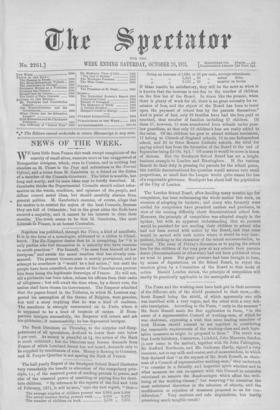Napoleon has published, through the Times, a kind of manifesto.
It is in the form of a monologue, addressed to a visitor to Chisel- burst. The Ex-Emperor denies that he is conspiring, for "it is only parties who feel themselves in a minority who have recourse to occult practices." For himself, " he casts from himself all low intrigues," and awaits the moral reaction that has already com- menced. The present Government is merely provisional, and to attempt to overthrow it " would be a bad action ;" but until the people have been consulted, no decree of the Chamber can prevent him from being the legitimate Sovereign of France. He will not, till a plebiscite has been taken, release his officers from their oaths of allegiance ; but will await the time when, by a direct vote, the nation shall have chosen its Government. The Emperor admitted that the papers found in the Tuileries, in which M. Lessines sug- gested his assumption of the throne of Belgium, were genuine, but told a story implying that he was a kind of madman. The manifesto is strongly commented on in Paris, where it is supposed to be a kind of loophole of escape. If Bona- partists intrigue successfully, the Emperor will return and ask his plebisoite ; if unsuccessfully, he has deprecated intrigue.


































